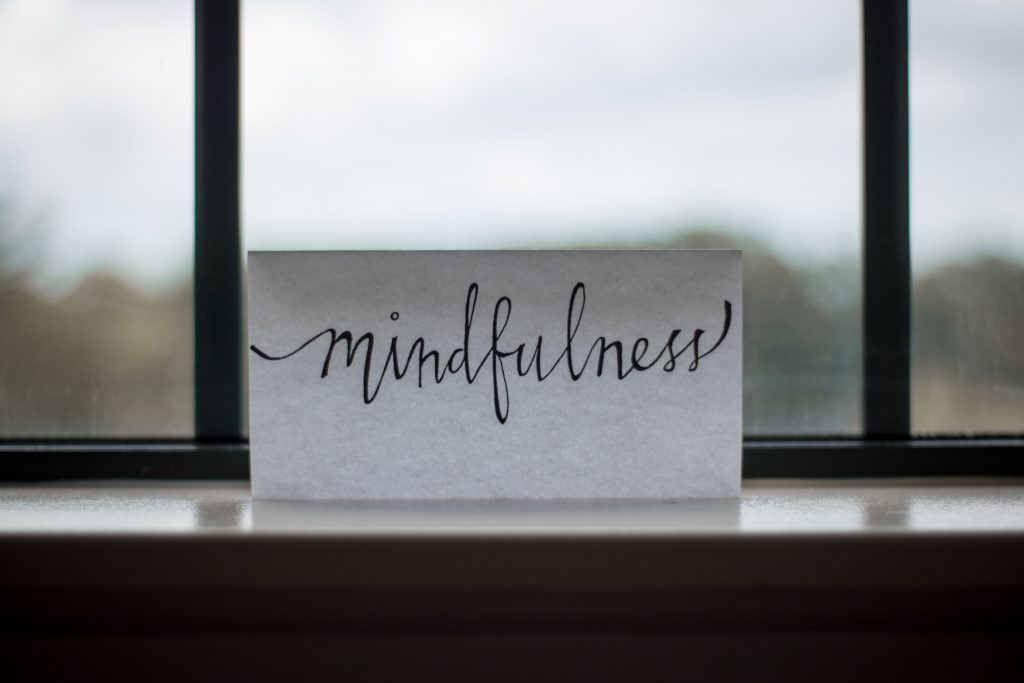Mindfulness is the practice of bringing one’s attention to the present moment in a non-judgmental way. It involves paying attention to one’s thoughts and feelings in the present moment without trying to change or suppress them. Mindfulness can be practised through various techniques, including meditation, deep breathing exercises, and mindful movement practices, such as yoga.
What is on this page
Mindfulness Techniques?
Meditation is one of the most common mindfulness practices. It involves sitting comfortably with the eyes closed and focusing on a specific object, such as the breath. As thoughts and distractions arise, the aim is to acknowledge and let them pass rather than get caught up in them.
Other mindfulness exercises may involve focusing on the senses, such as paying attention to the sensations of the breath or the sounds and sights in one’s environment. These practices can help individuals cultivate greater awareness of their thoughts and feelings and develop a sense of calm and clarity.
Mindfulness practices can be done for just a few minutes a day or longer periods, depending on the individual’s preferences and goals. It’s important to find a practice that works for you and to be patient and kind to yourself as you learn and grow in your mindfulness practice.

How Mindfulness Can Help Addiction Therapy
Mindfulness practices can be helpful for individuals in addiction recovery in several ways. Here are some ways in which mindfulness can support recovery:
- Reducing stress and cravings: Mindfulness practices can help individuals develop coping skills for managing stress and cravings, which can be common challenges in recovery. By bringing awareness to the present moment, individuals can recognise and acknowledge cravings and stress without reacting automatically. This can help them make more mindful choices about responding to these experiences.
- Improving emotional regulation: Mindfulness practices can help individuals develop greater emotional regulation by increasing their awareness of their emotions and the triggers that lead to negative emotional states. This can be especially helpful for individuals who may have struggled with impulsivity or difficulty managing their emotions before recovery.
- Increasing self-awareness: Mindfulness practices can help individuals develop a greater awareness of their thoughts, feelings, and behaviours. This can be a valuable tool for self-reflection and understanding the root causes of their addiction. By becoming more self-aware, individuals can make more informed choices about their recovery and the behaviours and patterns that support it.
Overall, mindfulness practices can be an important addition to addiction therapy by providing individuals with tools to manage stress and cravings, improve emotional regulation, and increase self-awareness.
Examples of Mindfulness Techniques in Addiction Therapy
Many different mindfulness techniques can be incorporated into addiction therapy. Here are some examples of mindfulness techniques that are commonly used in addiction treatment:
- Body scans: A body scan is a mindfulness practice that involves bringing awareness to each part of the body, starting at the feet and moving up to the head. This can be done lying down or sitting and involves paying attention to any sensations or emotions in each part of the body. Body scans can help reduce stress and improve relaxation.
- Mindful breathing: Mindful breathing involves focusing one’s attention on the breath and the sensations of the breath as it moves in and out of the body. This practice can help individuals develop greater awareness of their thoughts and emotions and can be a helpful tool for managing stress and cravings.
- Mindful movement: Mindful movement practices, such as yoga or tai chi, involve bringing awareness to the body and the sensations of movement. These practices can help individuals cultivate greater presence and awareness and can be a helpful tool for managing stress and improving physical and emotional well-being.
These are just a few mindfulness techniques that can be incorporated into addiction therapy. Other practices, such as guided imagery or loving-kindness meditation, may also be used depending on the individual’s needs and preferences.
Benefits of Incorporating Mindfulness into Addiction Therapy
There are many potential benefits to incorporating mindfulness into addiction therapy. Some of the benefits that have been observed in research include:
- Increased self-control: Mindfulness practices can help individuals develop greater self-control by increasing their awareness of their thoughts and behaviours. This can be especially helpful in managing cravings and avoiding triggers that may lead to relapse.
- Better decision-making: By increasing awareness and presence, mindfulness practices can help individuals make more mindful and informed choices about their recovery and well-being.
- Greater overall well-being: Mindfulness practices have been linked to many positive outcomes, including reduced stress and anxiety, improved sleep, and increased happiness and contentment. These benefits can be especially valuable for recovering individuals working to rebuild their lives and establish a sense of well-being.
Incorporating mindfulness into addiction therapy can be valuable for supporting recovery and improving overall well-being.

Tips for Practising Mindfulness in Recovery
Here are some tips for incorporating mindfulness into recovery:
- Set aside dedicated time for practice: Establishing a regular mindfulness practice can help maintain recovery and cultivate a sense of well-being. Consider setting aside a specific time each day for mindfulness practice, whether for a few minutes or an hour. Choose a time that works best for you and prioritise it in your schedule.
- Start small: Don’t feel like you must commit to an hour-long meditation practice immediately. Start with small increments of time and gradually build up to longer practices. Even a few minutes of mindfulness practice can be beneficial.
- Find a practice that works for you: There are many different mindfulness practices, so it’s important to find one that resonates with you. Experiment with different techniques and see what works best for you. It’s also okay to try different practices at different times, depending on your needs and preferences.
- Seek guidance: If you’re new to mindfulness or have struggled with maintaining a practice, consider seeking guidance from a therapist or trained mindfulness instructor. They can offer support and guidance as you establish a mindfulness practice and can help you address any challenges that may arise.
- Be patient and kind to yourself: It’s important to remember that mindfulness is a skill that takes time and practice to develop. Be patient with yourself and be kind to yourself when you struggle. It’s okay to have days when mindfulness is harder than others, and it’s important to be kind and compassionate to yourself as you learn and grow.
Conclusion on Addiction, Mindfulness and Therapy
In conclusion, mindfulness practices can be a valuable tool for individuals in addiction recovery. These practices can help reduce stress and cravings, improve emotional regulation, and increase self-awareness, all of which can be important factors in recovery.
Many mindfulness techniques can be incorporated into addiction therapy, including body scans, breathing, and movement. Incorporating mindfulness into treatment can have several benefits, including increased self-control, better decision-making, and greater overall well-being.
If you’re in recovery and are interested in incorporating mindfulness into your journey, many resources are available to help you get started. Consider setting aside dedicated time for practice, finding a technique that works for you, and seeking guidance from a therapist or trained mindfulness instructor. Above all, be patient and kind to yourself as you learn and grow in your mindfulness practice.

